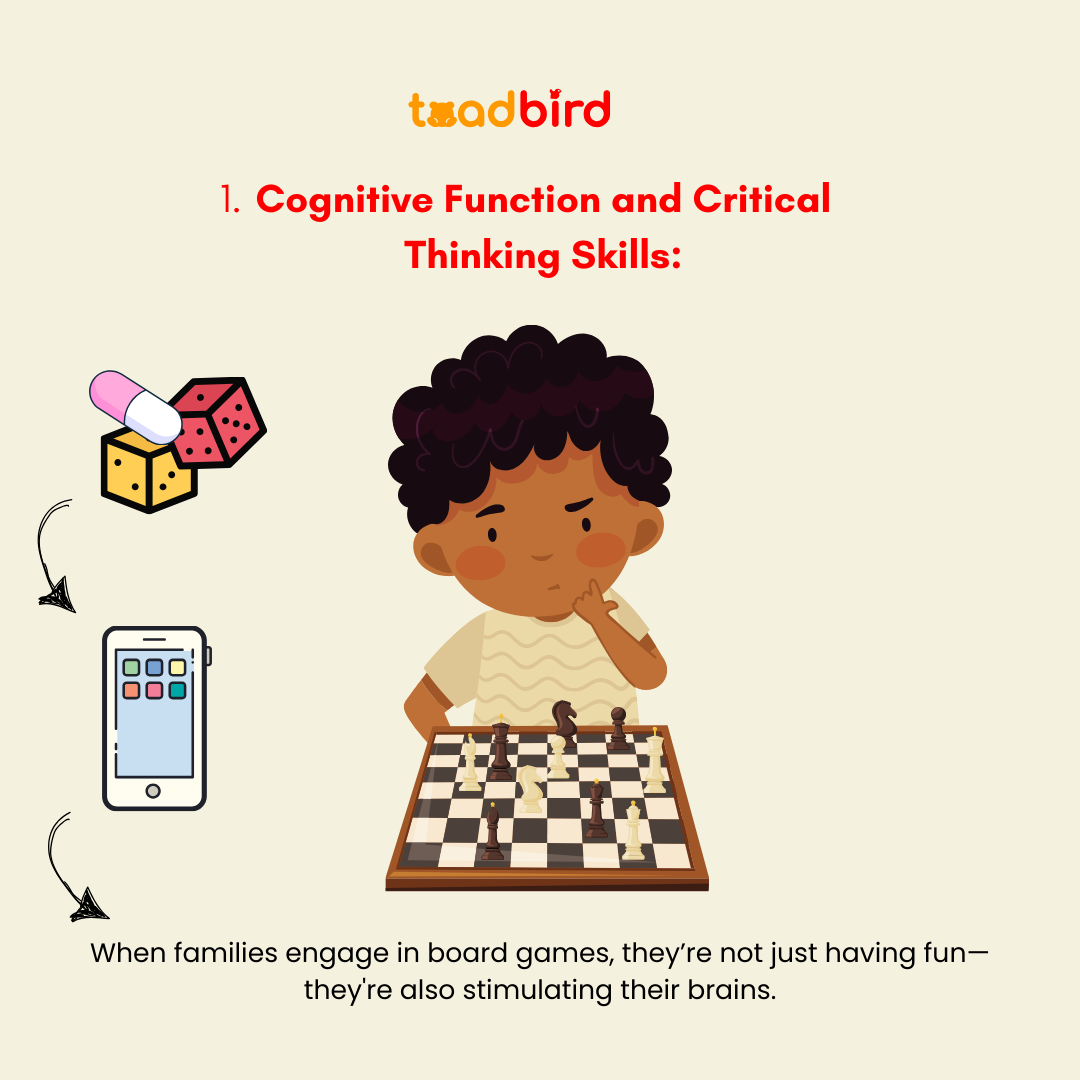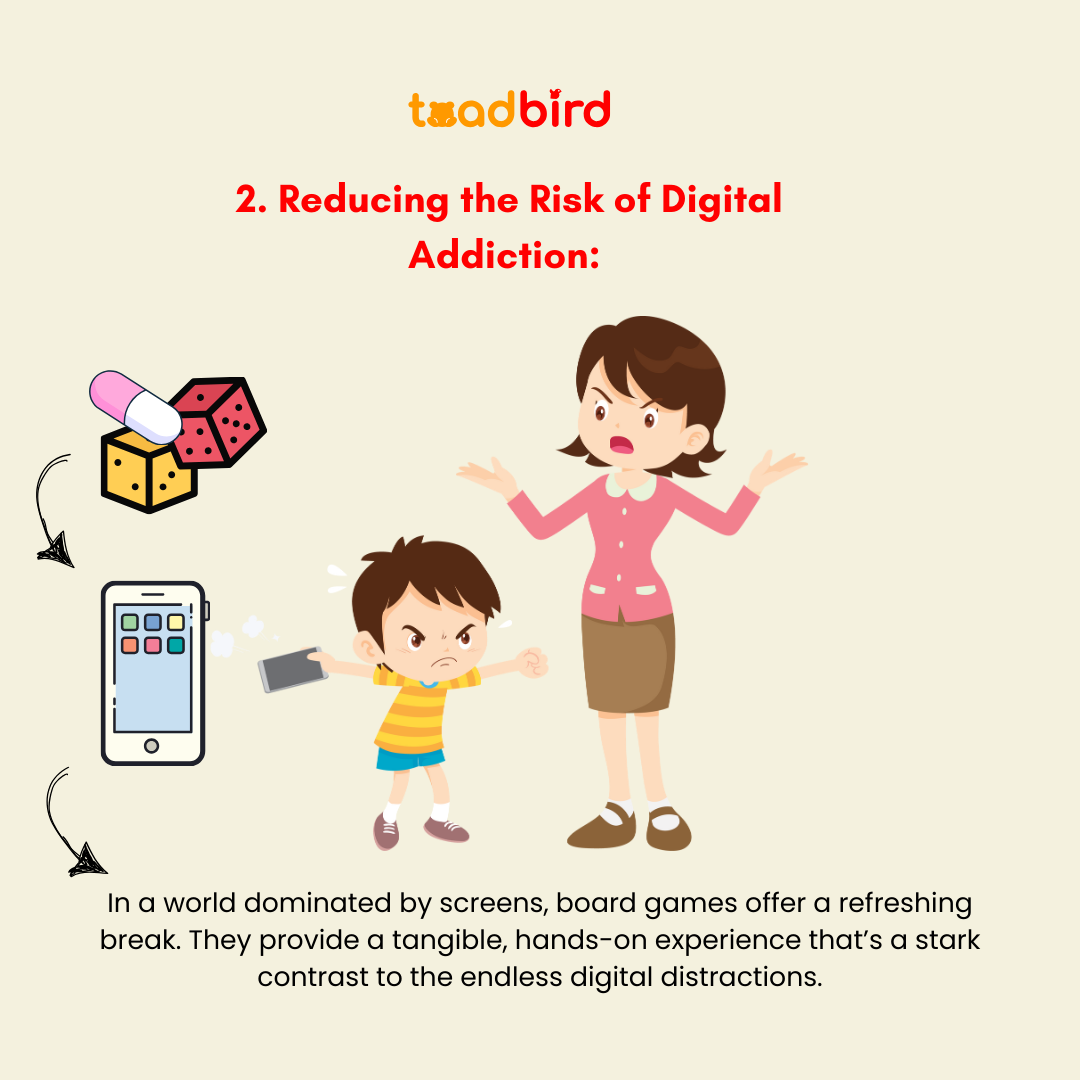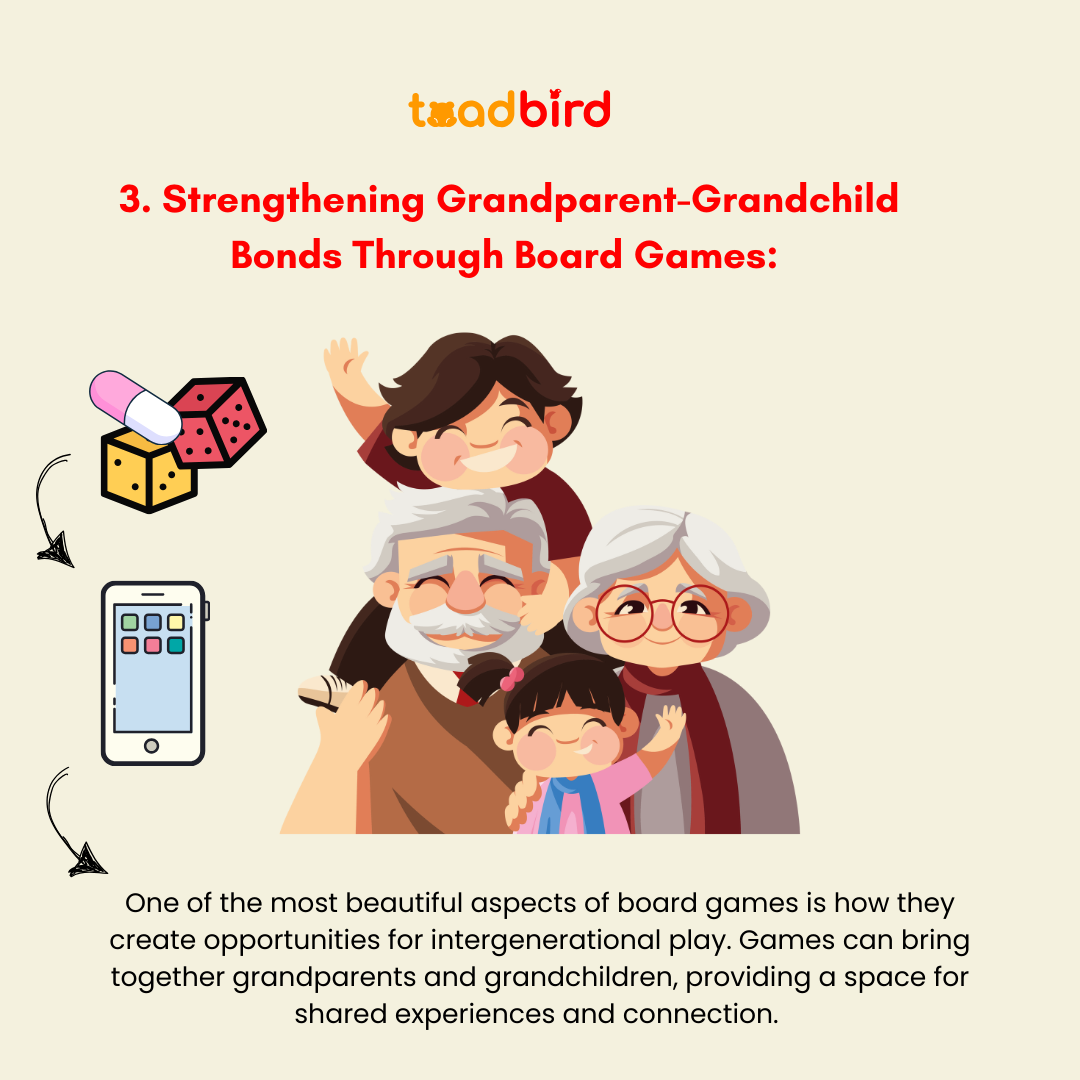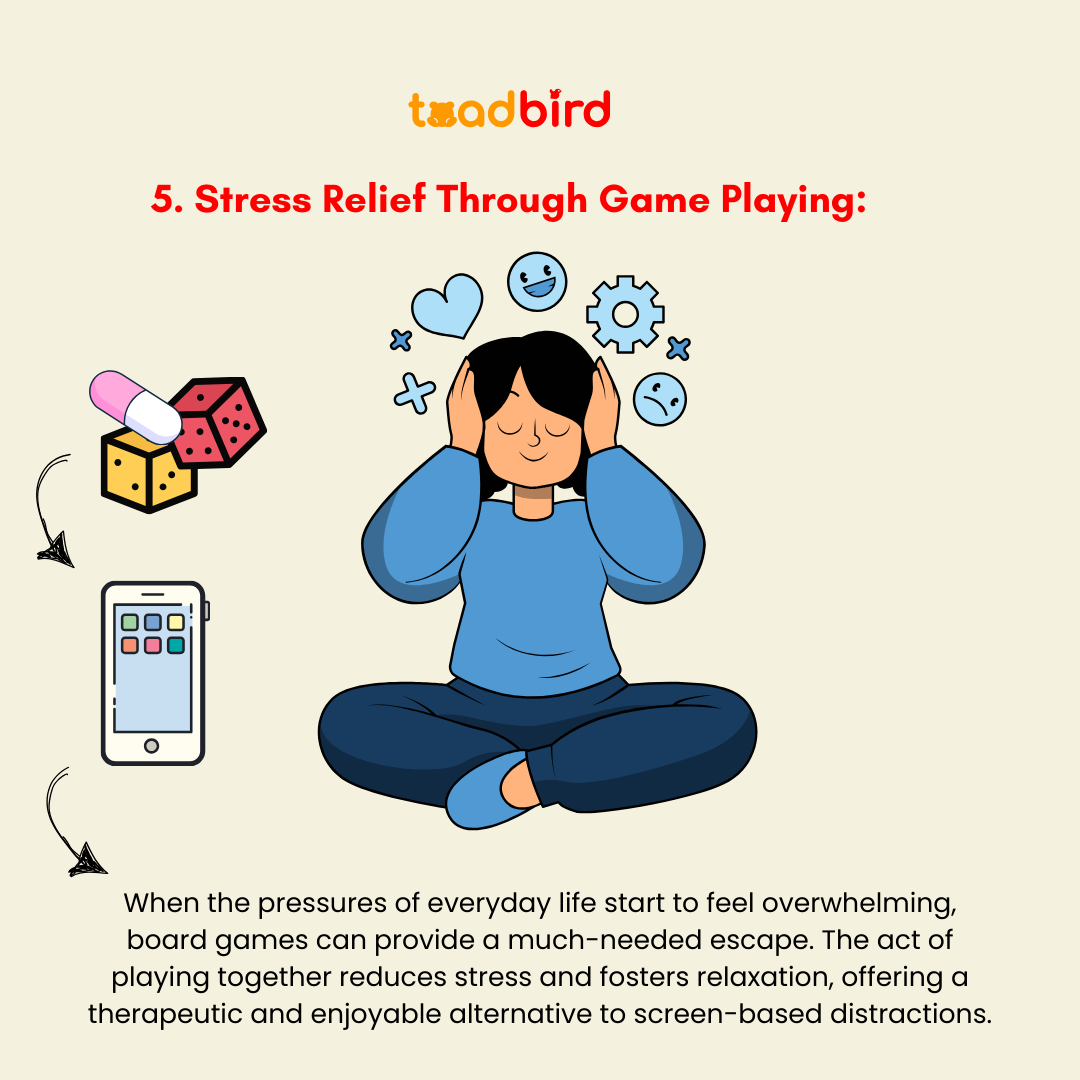How Board Games Can Reduce Screen Time and Bring Families Closer
Zeba ParkarShare
We all have those days—filled with meetings, and endless to-do lists. And when things get overwhelming, it's easy to hand a tablet or phone to your child and let them play until the storm passes. However, this reliance on screens to fill gaps in our parenting moments can eventually turn into something far more alarming: digital addiction.
As parents, we have all felt that pinch of guilt watching our little ones stuck to a screen. You wonder if they are missing the fun of unstructured play, bonding moments that build memories for a lifetime, or mastery of cognitive skills through problem-solving and interaction. That is where board games take center stage.
I have witnessed it firsthand when my kids were toddlers, introducing board games was like a miracle cure for endless screen time battles. It wasn't just about keeping them entertained—it was about connecting as a family, creating traditions, and fostering skills that would serve them for a lifetime.
Board games truly serve as the ultimate antidote to excessive screen usage and are a powerful tool for bringing families closer together, addressing key challenges of the digital age.
Here’s how:
1. Cognitive function and critical thinking skills

The playing of board games by families doesn't only bring joy but also challenges the brain. Unlike passive screen activities, board games actively stimulate problem-solving skills and help develop cognitive functions. This mental stimulation makes board games an excellent remedy against mindless scrolling, thereby making family time fun and mentally stimulating.
Consider examples such as Chess or Shoots and Ladders. Such classic board games are an epitome of forward planning, patience, and adaptability. A child will be trained to analyze situations, take decisions, and alter his strategies accordingly in relation to outcomes.
Specifically, board games that have an educational theme, such as Guess the fence, take it one step further and combine fun with learning. They are designed to build problem-solving skills while introducing academic concepts or life skills. Watching your child solve a tricky puzzle or master a new strategy is not just rewarding-it's a clear investment in their cognitive and social growth.
2. Reducing the Risk of Digital Addiction

Unlike passive screen-based activities, board games will engage your hands, stimulate various senses, and be fun while creating moments of laughter, competition, and cooperation among children, thus pulling kids out of the digital bubble and putting them into the real world.
Excessive screen usage, if unchecked, can lead to sleep disturbances, mood swings, and impaired social skills. By swapping screen usage for game time, you’re helping your child develop healthier habits while creating an opportunity for quality family time.
The moment board games become a daily ritual for the family, replacing digital distractions is easy. Family time sitting together around a board game encourages interaction, teamwork, and shared memories that screens miss out on.
3. Strengthening Grandparent-Grandchild Bonds Through Board Games

Board games offer a great opportunity for intergenerational play, creating moments where grandparents and grandchildren can connect in meaningful ways. Think of the joy of watching Grandpa play Monopoly with the youngest member of the family or a family of all ages gathered around a table playing well-known board games like Scrabble. These shared experiences create an opportunity to bond across generations, strengthening the family relationship while exercising communication skills.
In the digital age today, where many families feel pressures of online gaming and digital distractions, board games offer a respite from screens. While playing board games, no family video calls or online distractions exist; only the joy of real-time interaction. These games allow for connection between grand parents and the grand children through a means which is not feasible by online plays or video calls. The jokes shared and competitive spirit between them keep those memories way after the play itself, therefore making family time worthwhile.
Game playing for many families has become a sure way to have quality time with family members and not just play games but learn from one another. It is not just the instructions on the game or its success but more about the deep conversations and bonding that are developed around the table. Whether grandpa teaches the game or members strategize over it, such moments maintain a strong bond among family members even among extended members.
4. Reduced risk of dementia and Alzheimer’s

Playing board games not only strengthens the bond between the family members but also has a tremendous impact on their cognitive health. Engaging in activities such as playing board games helps maintain the cognitive function that is so much needed for elderly family members. Games that stimulate critical thinking and problem-solving—such as Chess or even that well-loved card game—are great at helping to reduce the risk of dementia and Alzheimer's.
Board games become a natural way to keep the minds of parents or grandparents sharp as families look for ways to support them in their daily lives. It enables older adults to practice important cognitive skills on a regular basis, keeping them mentally active and giving them a chance to interact socially. In fact, research has shown that intergenerational board game play can even be used to maintain cognitive function and promote both older and younger family members to bond, share, and learn together.
Board games also offer an opportunity for seniors who are experiencing some degree of cognitive decline to connect with their loved ones in a fun, therapeutic way. Playing games will help them keep up social relationships, which is a very important aspect of mental health, while having fun at the same time in a low-stress activity. By including game nights as part of your family's routine, you are not only spending quality time together but also providing your loved ones with the mental stimulation they need to stay sharp even in their later years.
5. Stress relief through game playing

Boards form a great mode of entertainment which can be unwound during those busy times; whether it's the fast and quick decision made in a Monopoly game or the strategic planning in educational games such as Mystic Arts, the simple act of playing allows us a momentary escapade from life's pressures. Instead of relating our lives to the perfect showcases we observe on social media, board games give us the opportunity to focus on shared moments of joy, fun, and connection. Thus, they help free us from the digital clutter and from the quality time family can spend together, laughing and competing in a light-hearted sort of way. This simple but powerful activity not only brings families closer together but also provides a meaningful distraction from the constant rush of everyday stress.

Board games present a mental challenge but also allow for relaxation. They create an opportunity for family members to be taken away from work, school, and stressors of daily life. The shared laughter, friendly competition, and the thrill of a game's outcome can immediately lift your mood, which reduces anxiety and provides stress relief.
For parents and grandparents, these moments of calm are priceless. Game playing allows families to disengage from the digital world—no video calls, no online gaming, just the sheer pleasure of each other's company. As intergenerational board game play continues, it creates family bonding while building a feeling of oneness that can uplift spirits and help tension melt away. Playing board games resets, recharges, and reconnects family members. Thus, it is one of the most excellent stress relief methods, yet it improves cognitive function and enhances communication skills as well.
With so many board games to choose from, families have endless opportunities to create fun, meaningful moments, whether during a Christmas gathering or on any ordinary day. Game nights become a tradition that not only offers stress relief but strengthens relationships and improves well-being for everyone involved.
Why Choose Board Games for Family Bonding?
The Power of Play: How Board Games Bring Families Together
Play is not a childhood activity; it is a common activity that transcends age barriers. The simplicity of playing board games provides so many opportunities for families to grow together. Playing board games is known to develop creativity, encourages critical thinking, and even improves problem-solving abilities. With such strategy games as well as more lighthearted games like card games, every play of each game calls for critical thinking and planning with each family member and solves issues among group members.
Board games also teach teamwork, because most of them require collaboration in order to win, whether cooperative or a friendly match. Shared effort is a very powerful way of building stronger family bonds, enhancing communication skills, and encouraging mutual support among family members.
Learning Through Play: Developing Social Skills
Board games are more than just a fun way to pass the time; they are also an educational tool. As family members engage in game playing, they naturally develop social skills like communication, turn-taking, and patience. In addition, they also practice cognitive skills like memory, problem-solving, and decision-making.
These games are also part of the group called Educational board games, where Mystic Arts is an example, increasing math skills, as well as critical thinking, and even language proficiency. They transform learning into interactive fun experiences to develop important life skills. On the other hand, playing these games together promotes positive family interactions that are going to benefit everyone, whether young children or grandparents, in developing better problem-solving skills, creativity, and teamwork.
Creating a Sense of Community through Game Nights
From my personal experience, family game nights can evolve into something much more than just an evening pastime-they become a cherished tradition, a time to disconnect from the digital world and reconnect with the people who matter most. When you set aside time to sit together and play board games, it's about more than just moving pieces around a board. It's about making memories that would last for generations, bonding families closer to themselves, and building a sense of community within your household.
Over the years, I’ve seen firsthand how these moments can help reduce screen time and foster deeper connections. Whether you’re playing games with your children, your parents, or extended family members, game nights provide a natural space for everyone to connect, laugh, and share experiences. These moments often lead to more meaningful interactions, teaching everyone involved that quality time together is priceless.
Building Strong Connections through Game Playing
The Joy of Competition: How Board Games Foster Healthy Rivalry
I must be honest, though. One of the most thrilling things about board games is friendly competition. It brings out the best in people, challenging us to think on our feet, solve problems immediately, and strategize to outplay the opponent. That is one of the main reasons I suggest adding board games to your family's routine. It brings that kind of excitement into your game night while developing problem-solving skills, a most critical aspect of thought in playing board games.
I have noticed that in board games, families compete, but they are not just learning how to win but also how to work as a team, share ideas, and respect others' strategies. These experiences translate beyond the board—strengthening family bonds and preparing kids with real-world skills that will serve them for years to come.
Bonding with Family and Friends through Shared Experiences
It shows something special about these occasions-family games nights serve entertainment, creating one common denominator amongst all-the ages. Indeed board games manage to bring old into the conversation at the time; children play alongside their peers of different generation thus learning great deal of the life skills meanwhile engaging the geriatrics in other substantial engagement.
What I’ve found particularly powerful is how games like these allow people of all ages to share the same space, share laughs, and form lasting memories. I’ve seen children’s faces light up when playing with their grandparents, and it’s this sense of togetherness that makes game nights such a vital part of family life.
Improving Confidence through Game Playing
In my experience, one of the most rewarding aspects of playing board games is observing family members grow in confidence, especially kids. Something about the structured challenge of a board game empowers a player to take risks, try new strategies, or find a thrill in competition-all within a safe, supportive environment.
Whether it is a child who has always been shy about speaking up or an adult who isn't usually keen on taking risks, board games are a great way to step out of your comfort zone. Tackling challenges together in game playing improves communication skills, fosters self-confidence, and promotes a sense of accomplishment when you work through tough problems as a team.
Cutting Back on Screen Time with Board Games
Unplugging from Screens: The Benefits of Playing Games Offline
I'm a parent who has tried balancing screen time with the kids and myself during the digital age. As a result, I can honestly say that board games are among the best means to reduce screen time and engage in healthy habits when offline. In our home, board games have been a means of "unplugging" from constant phone, tablet, and TV pulls. It is one of the few activities that actually promotes face-to-face interaction.
Reducing screen exposure, especially with children, isn't just about limiting access to digital devices; it's about offering enriching alternatives. Board games encourage quality conversation, problem-solving, and collaboration, all while helping to minimize the negative effects of excessive screen exposure.
Reducing Digital Addiction through Board Games
Having seen the effects of digital addiction on children and adults alike, I know just how important it is to have a balance. Board games have been a game-changer in this department, pun intended! When you sit down with your family for a game, you are not just taking a break from screens; you are providing fun, interactive cognitive development without the risks of overloading with screens.
The benefits extend beyond just reducing digital addiction. Board games, particularly educational ones, teach children how to think critically, plan ahead, and engage in social problem-solving—all skills that help build well-rounded, confident individuals.
Creating a Healthy Balance between Screen Time and Game Playing
One of the best things I’ve found about integrating board games into family time is how it naturally creates a healthy balance between screen time and other activities. In our household, board games have become the "go-to" activity for quality time—no screens required.
It is all about boundaries and healthier alternatives. Board games encourage hands-on learning and socialization while teaching kids to think critically, communicate, and work together. These are the kinds of moments I believe every family should prioritize in today's fast-paced, digital world.
Conclusion
In my opinion, board games are among the most underrated tools available to make family life better. Whether it improves cognitive functioning, minimizes screen time, or even shares quality time together, board games offer an assortment of benefits that go well beyond entertainment. They promote healthy competition, encourage critical thinking, and, most importantly, strengthen family ties.
If you haven't made board games a part of your family routine yet, start now. Gather around the table, unplug from the screens, and let the game playing begin. Trust me—you'll be creating memories that will last a lifetime. And if you are looking for family friendly board games, be sure to check out our curated collection at Toadbird.